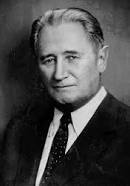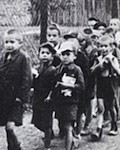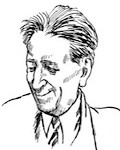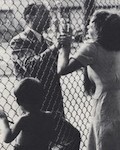Nahum Goldmann (1895-1992), a senior official of several Jewish organizations, was at the center of Jewish political activity during the Holocaust years, including efforts in 1944 to persuade the Allies to bomb Auschwitz.
Born in Russia and raised in Germany, Goldmann co-founded the World Jewish Congress, along with Rabbi Stephen S. Wise, in 1936. He subsequently settled in the United States, and later became the Washington, D.C. representative of the Jewish Agency for Palestine, in addition to his duties with the World Jewish Congress.
Goldmann usually shared Wise’s preference for political caution. However, when the Roosevelt administration refused to permit Jewish leaders to present the case for rescue at the Bermuda conference, a furious Goldmann declared at an April 18, 1943 meeting of the Joint Emergency Committee for European Jewish Affairs that “the time has come to change our policy–we have to oppose the American and British governments’ attitude and act accordingly.” He proposed an emergency rally in Washington of “1,000 to 2,000 representatives of all Jewish organizations” to press for rescue. Under Wise’s influence, however, Goldmann soon backtracked. By mid-July, he was telling his colleagues on the Joint Committee that mass meetings were “futile.”
In 1944, Goldmann devoted a significant portion of his time to trying to convince U.S. government officials and foreign diplomats in Washington to oppose the Bergson Group. He urged the State Department to “draft or deport [Peter] Bergson,” claiming that Bergson’s vociferous protests would provoke antisemitism.
Goldmann also strongly opposed the activist approach of Wise’s chief rival for the leadership of the American Zionist Movement, Rabbi Dr. Abba Hillel Silver. “We cannot
fight against all the powers of the world, and antagonize everybody,” Goldmann said.
During the summer and autumn of 1944, Goldmann repeatedly contacted Allied officials to urge the bombing of the Auschwitz death camp. He met with Soviet diplomats to propose bombing, and also asked officials of the Czech government-in-exile to use their influence with the Soviets on the issue. Goldmann also raised the issue with British and American officials, and sent his deputy Maurice Perlzweig to do likewise, but all their requests were denied.
On several occasions after the war, Goldmann publicly expressed regret that he and other Jewish leaders had refrained from adopting an activist strategy. He said the decision was made because they felt “we must not disturb the war effort of the Free World against Nazism by stormy protests.”
Sources: Medoff, FDR and the Holocaust, pp. 175-178;
Medoff, Militant Zionism in America, pp. 132-133, 184-187.











